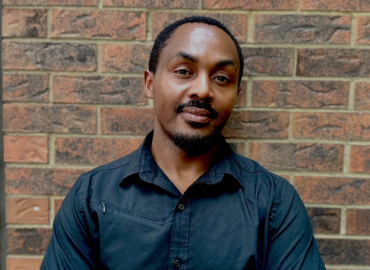Kariuki Kirigia
Kariuki Kirigia (PhD, McGill University) is an Assistant Professor within the School of the Environment and African Studies Centre at the University of Toronto. Kariuki’s research lies at the intersection of climate change, biodiversity conservation, territories of life, land governance, food security, African epistemologies and pedagogies, and sustainability in Africa, and adopts engaged approaches to research sutured by partnerships with African indigenous organizations and African universities.
Prior to joining the University of Toronto, Dr. Kirigia completed an FRQSC-funded postdoctoral fellowship at Concordia University in Montreal, Canada, which examined the institutional alienation of African indigenous communities from conservation in Kenya. In the past, he has conducted research on the nexus between floriculture investments, land and water governance, and local food security in Kenya, Tanzania, Uganda, Ethiopia, and the Netherlands; agriculture, youth, and food security in Ghana; vocational education and corporate social responsibility (CSR) in Tanzania; payment for ecosystem services (PES) in Uganda; and community-driven hydro-electricity projects and microfinance loans among small-scale entrepreneurs in Central Kenya. Some of Dr. Kirigia’s key publications include journal articles, book chapters, and an edited volume titled “‘African Potentials’ for Wildlife Conservation and Natural Resource Management: Against the Image of ‘Deficiency’ and Tyranny of ‘Fortress’”.
Dr. Kirigia is currently working on a book manuscript titled “Promises of Property: The Expansion of Capitalist Relations on an African Indigenous Frontier” and is involved in several collaborative research projects in Africa and North America focused on various themes including climate change, biodiversity conservation, and land governance.
Awards & Grants
• Sasakawa Young Leaders Fellowship Fund (SYLFF)
• Utrecht Excellence Scholarship
• Geosciences Scholarship, Utrecht University
• Grad Excellence Award in Anthropology, McGill University
• Institutional Canopy of Conservation (I-CAN) (SSHRC & IDRC) Graduate Scholarship
• Graduate Mobility Award, McGill University
• Sasakawa Young Leaders Fellowship Fund (SYLFF) Research Abroad Award
• Wolfe Graduate Fellowship, McGill University
• COVID-19 Relief for Sasakawa Young Leaders Fellowship Fund Fellows
• FRQSC Postdoctoral Fellowship, Quebec, Canada
• Concordia University Conference and Exposition Award, Concordia University
Publications
Meguro, T., Ito, C., & Kirigia, K. (Eds.). (2021). 'African Potentials' for Wildlife Conservation and Natural Resource Management: Against the Image of 'Deficiency' and Tyranny. African Books Collective.
Riamit, K. O., & Kirigia, K. (2021). On Indigenous Organic Intellectuals: Struggles against Pastoral Land Dispossession in the Maasai Commons in Postcolonial Kenya. 'African Potentials' for Wildlife Conservation and Natural Resource Management: Against the Image of 'Deficiency’ and Tyranny, 149.
Meguro, T., Ito, C., & Kirigia, K. (2021). Reality of ‘African Potentials’: Informal, Invisible and Dynamic Nature without an Arena. 'African Potentials' for Wildlife Conservation and Natural Resource Management: Against the Image of ‘Deficiency’ and Tyranny, 323.
Kirigia, K. (2021). “An appraisal of promises after the ruins: The global land rush in Africa,” review of The Transnational Land Rush in Africa: A Decade After the Spike, by Logan Cochrane and Nathan Andrews (Eds.). AfronomicsLAW.
Kirigia, K., & Riamit, Kimaren. 2018. Land Injustices in Kenya’s Wildlife Conservancies. Global-E: Tourism and Development in Africa, 11 (50).
Kirigia, E., Betsema, G., Westen, G. v., & Zoomers, A. (2016). Flowers for Food? Scoping study on Dutch flower farms, land governance and local food security in Eastern Africa.
People Type:
Research Area:
• Climate and environmental justice
• Biodiversity conservation
• Land governance and dispossession
• Food security
• Neoliberal and racial capitalism
• Sustainability and alternatives to development
• African indigenous epistemologies and pedagogies
• Engaged and experiential learning



